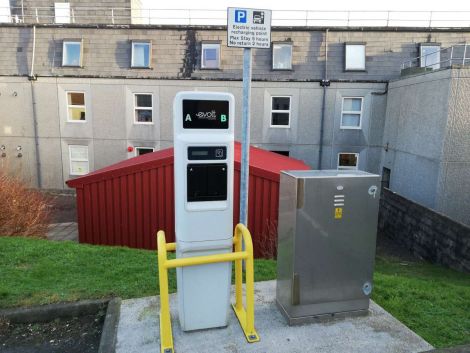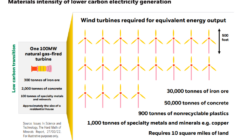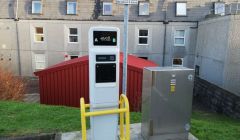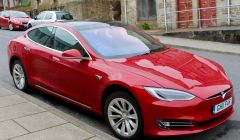Council / Councillors to consider introduction of electric vehicle charger fees
A PROPOSAL will be put to elected members in the coming months to introduce fees for Shetland Islands Council’s public electric vehicle (EV) chargers from next year.
It comes part of Shetland Islands Council’s budget setting process for the next financial year, which begins in April.
However, there continues to be concerns among the EV community over the reliability of some charging points.
At the moment using public EV chargers provided by the council in Shetland comes at no cost.
They are dotted around the isles, from Unst to the South Mainland, and have been installed using external funding.
More people are using electric vehicles, and as such, more chargers are being installed over time.
Last year council bosses felt that introducing charges then could have sent out the “wrong message” in the drive away from fossil fuels.
Many other councils in Scotland, though, charge for public EV stations.
In Orkney for instance, the cost is due to rise to up to 38 pence per kWh, and there is a minimum charge in addition to overstay fines.
A report to Orkney councillors in September said there was a “careful balance” required when setting EV charging fees.
It said that recovering the full cost of providing the power in Orkney would require fees “far in excess of the cost of domestic electricity”, meaning the usage would fall.
A spokesperson for Shetland Islands Council said: “Proposals to introduce a cost from April 2023 for EV charging at public locations in Shetland will be presented to councillors in the coming months, as part of the budget setting process.”
Councillors were recently warned that there would be “difficult choices” when setting the 2023/24 budget.
The council is projecting an overall £2.5 million overspend in this current financial year, and if not addressed the deficit only stands to become larger later down the line.
Become a member of Shetland News
Local driver Rod Read said he has had the “luxury” of having two electric vehicles in his household for the last year.
He said the availability of free charging is “very generous” and said “fees for the energy we use will only be fair”.
Read said having no fees “has surely helped convince more people to try EV, which is brilliant”.
“There’s no way we would consider going back to fuel,” he added.
“However, the total availability of charging infrastructure is limited and access to charging is becoming contentious.
“It takes a lot longer to charge – 20 per cent to 80 per cent in 17 minutes on a rapid charger – than fill up a tank.”
Read also said chargers can be “terribly unreliable”, and real-time information on availability can sometimes be wrong.
People can also charge their electric vehicles at home, but the cost is dependent on their tariff.
Become a member of Shetland News
Shetland News is asking its many readers to consider paying for membership to get additional features and services: -
- Remove non-local ads;
- Bookmark posts to read later;
- Exclusive curated weekly newsletter;
- Hide membership messages;
- Comments open for discussion.
If you appreciate what we do and feel strongly about impartial local journalism, then please become a member of Shetland News by either making a single payment, or setting up a monthly, quarterly or yearly subscription.
















































































